
In a world increasingly focused on health and sustainability, plant proteins are becoming the preferred protein choice for many. (
1
) Pea protein stands out from other plant-based proteins because of its nutritional profile and versatility, providing all essential amino acids in a form that’s easy to digest and less likely to cause an allergic reaction. (
2
) Whether you want to build muscle, lose weight, or support increased protein needs, protein powder supplements made from peas are a healthy and environmentally friendly way to go.
Because of the increasing popularity of pea protein powders, the market is exploding with options. Our team of fitness and nutrition experts tested dozens of the
best protein powders
to determine our list. We looked at ingredients, dose, effectiveness, taste, price, and customer experience. We narrowed our list to these eight best pea protein powders on the market right now.
Editor’s choice
Nutricost Organic Pea Protein Isolate
is a great option for those seeking a clean and organic pea protein powder. Here’s why it stands out:
-
Provides 20 grams of protein per serving with only one ingredient—organic pea protein isolate.
-
Dairy-free, gluten-free, and soy-free, making it suitable for various dietary needs.
-
Affordable and made from 100% USDA organic peas.
-
A clean, high-quality protein option for those looking for simplicity.
Medical disclaimer: This article is intended for educational and informational purposes only. It is not intended as a substitute for medical advice. For health advice, contact a licensed healthcare provider.
Our picks for the best pea protein powder
How to choose the best pea protein powder for you
When choosing the best protein powder for you, you need to consider a few factors to find one that fits your goals and preferences.
Health goals
Your health goals are a good place to start when looking for a pea protein powder. Do you want to build muscle, lose weight, improve strength, or simply get more protein into your diet? Your goals help determine if you want a simple pea protein powder or one with added ingredients that align with your goals.
Protein content
The amount of protein in a pea protein powder varies. (We’d recommended aiming for around 20 grams per scoop of protein powder.) Find an option that provides what you need. If you’re not sure, consult with a registered dietitian for guidance.
Ingredients
When looking for a pea protein powder, look at the ingredients list. You want a protein powder with little to no added sugar, artificial ingredients, or unnecessary additives. The label should also list any food allergens, so if you have food allergies, you will want to make sure the pea protein powder doesn’t contain any ingredients that may cause a reaction.
Some pea protein powders may also have added active ingredients to support different nutrition and health goals, like vitamins and minerals, amino acids, or other plant proteins like brown rice.
Taste
Taste matters when it comes to choosing the best pea protein powder for you. Choose flavors you like and use them in a way that fits your lifestyle.
Third-party testing
When shopping for dietary supplements like pea protein powders, look for brands that have certifications and third-party testing. This means the supplement has been independently lab-tested for quality and potency, and only contains the ingredients listed on the label. (
3
)
Price
Pea protein powders come in a wide range of prices. The cost of the supplement, however, isn’t a good marker of quality or efficacy. The pea protein powder with the best value is the one that fits your budget, tastes good, and supports your health needs.
Compare pea protein powders
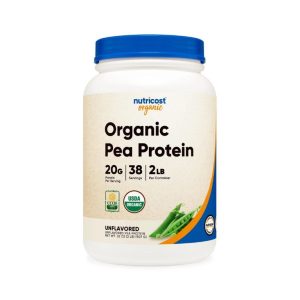

Nutricost Organic Pea Protein Isolate is an affordable, single-ingredient, USDA-certified organic pea protein powder.
Key product features
Protein
20 grams
Ingredients
1
Vegan
Yes
Subscription
Yes
What you should know
Nutricost Organic Pea Protein Isolate is certified USDA organic and has just one ingredient: organic pea protein isolate. One serving provides 20 grams of protein and is 100 calories.
-
Nutricost Organic Pea Protein Isolate Powder is unflavored, making it a versatile option for adding more protein to smoothies, plant milk, soup, and more.
-
At $0.47 per serving for the five-pound container, Nutricost Organic Pea Protein Isolate Powder costs almost $0.30 less than the low average market price for pea protein powders.
-
This is a good option for people with food allergies or food sensitivities looking for a simple, hypoallergenic pea protein powder to support their nutrition needs.
Pros
Meets 30% of the daily value for iron
Priced below average market cost
Cons
Some consumers dislike the taste
Provides 20 grams of protein per serving, which is less than other options
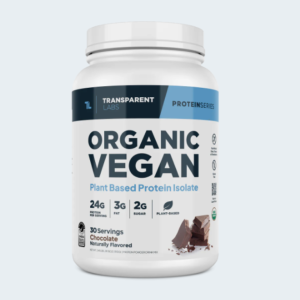

Transparent Labs’s vegan protein powder offers 24 grams of high-quality protein from a mix of pea and brown rice proteins.
Key product features
Protein
24 grams
Gluten-free
Yes
Added sugar
No
Flavors
2
Subscription
Yes
What you should know
Transparent Labs Organic Vegan Rice and Pea Protein is a high-quality protein powder with 24 grams of protein per serving. It’s available in chocolate and vanilla, sweetened with stevia, and has no added sugar or artificial ingredients.
-
Our product testers noted that the powder mixed well, but had a gritty texture.
-
At $1.67 per serving, Transparent Labs Organic Vegan Protein Powder is priced a little higher than the average market price.
-
This is a good choice for bodybuilders following a vegan diet who are struggling to meet protein needs to make muscle gains.
-
Preliminary evidence suggests that the rice and protein blend in the vegan protein powder may promote muscle growth and strength development when combined with resistance exercise as well as whey protein. (
6
)
Pros
Better amino acid profile than many other pea protein powders
Has no artificial sweeteners, colors, or flavors
Uses organic pea and brown rice protein powder
Cons
Only available in two flavors
Sweetened with stevia and may have an aftertaste
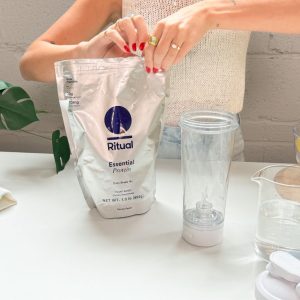

Ritual Daily Shake is a great natural option that comes in a vanilla flavor and contains traceable ingredients.
Key product features
Protein
20 grams
Gluten-free
Yes
Ingredients
Traceable
Return policy
30 days
Subscription
Yes
What you should know
Ritual Essential Protein Daily Shake is a vanilla-flavored pea protein powder designed to support muscle recovery and muscle building after working out, providing 20 grams of protein per serving.
-
Ritual Daily Shake has 493 milligrams of methionine added, so the amino acid profile more closely resembles whey protein. (
7
)
-
At $2.93 per serving, Ritual Daily Shake is one of the most expensive pea protein powders on our list and costs $1.10 more than the average market price.
-
This may be a good option for people who want to know where the ingredients in their pea protein supplements come from.
-
Ritual products are sold as a subscription, and orders are automatically sent every 30 days unless you make a request to delay or cancel it.
Pros
Provides 4 grams of BCAAs
Meets 10% of the daily value for fiber
All ingredients are traceable
Has 493 mg of added methionine, to improve amino acid profile
Cons
Costs more than twice the average market price
Contains tree nuts (coconut oil)
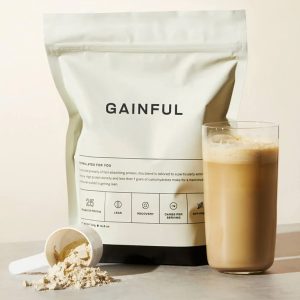

With only three ingredients, Gainful’s Plant-Based Lose Weight Protein Powder packs 24 grams of protein per serving.
Key product features
Protein
24 grams
Flavors
8
Subscription
Yes
Ingredients
Natural
What you should know
Gainful’s Plant-Based Lose Weight Protein Powder uses organic pea protein and organic brown rice protein to provide 24 grams of high-quality protein in every serving.
-
Gainful’s customized protein powders come with single-serving flavor boosters, so you can change the flavor of your shake every day.
-
At $3.21 per serving, Gainful Plant-Based Lose Weight Protein Powder is almost three times more expensive than the average market price for pea protein powders.
-
Gainful’s plant-based protein powder is a good choice for health-conscious individuals looking for a protein powder without adding flavoring or artificial ingredients.
-
You get free access to registered dietitians for nutrition guidance with your Gainful subscription.
Pros
Uses pea and rice protein to improve the amino acid profile
Can purchase single-serving flavor boosters for more variety
Access to registered dietitians with subscription
Cons
Only 14 servings per container
Costs nearly three times more than the average market price
Best pea protein powder for men:
Legion Plant+
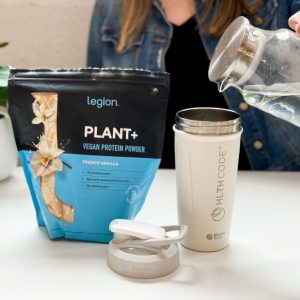

Legion Plant+ is a great-tasting, high-quality pea and rice protein powder that comes in a variety of flavors.
Key product features
Protein
24-25 grams
Flavors
6
Sweetener
Stevia, monk fruit
Gluten-free
Yes
Money-back guarantee
Yes
What you should know
Legion Plant+ protein powder uses pea protein and brown rice protein concentrate to provide 24-25 grams of protein per serving. The protein powder is available in six flavors and is suitable for people following a vegan diet.
-
Some of our reviewers said the protein powder was too sweet, but was easy to mix without a blender or shaker cup.
-
At $2.50 per serving, Legion Plant+ protein powder costs about a dollar more than the higher end of the average market price for pea protein powders, which is about $1.50.
-
With 25 grams of protein per serving, it’s perfect for men who are trying to build muscle but follow a vegan diet.
-
Legion offers a no-return necessary money-back guarantee if you don’t love the plant-based protein powder.
Pros
Provides 24-25 grams of high-quality plant protein
Gluten-free, soy-free, and dairy-free
100% money-back guarantee
Cons
Some consumers find the protein powder too sweet
Only 20 servings in each container
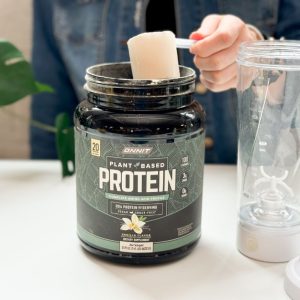

Onnit Plant-Based Protein Powder uses a mix of plant proteins to pack 20 grams of high-quality protein in every serving.
Key product features
Protein
20 grams
Calories
100
Sweetener
Stevia/monk fruit
Flavors
2
Keto-friendly
Yes
What you should know
Onnit Plant-Based Protein Powder uses pea protein, pumpkin seed protein, sunflower seed protein, and watermelon seed protein to improve mixability and the amino acid profile of the supplement. One serving has 20 grams of protein and 100 calories.
-
The pea protein powder also has added leucine to support muscle building. (
6
)
-
At $2.25 per serving, Onnit Plant-Based Protein Powder costs about $0.75 more than the higher end of the average market price for pea protein powders.
-
This may be a good option for people following a reduced-calorie, high-protein, plant-based weight loss diet who are struggling to meet protein needs.
-
Onnit Plant-Based Protein Powder uses avocado powder to add healthy fat and improve flavor and texture.
Pros
Added leucine to support muscle growth
Multiple plant sources for improved amino acid profile
Cons
Only 20 servings per container
Costs double the average market price for pea protein powder
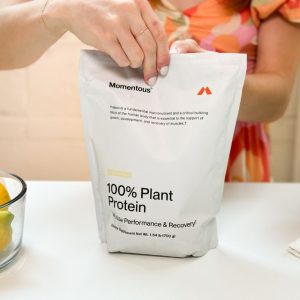

With a rich, chocolaty taste, Momentous 100% Plant Protein is a delicious way to get 20 grams of high-quality protein.
Key product features
Protein
20 grams
Sweetener
Cane sugar
Solubility
Good
Subscription
Yes
What you should know
Momentous 100% Plant Protein is a more macro-balanced supplement than some other pea protein powders, providing 20 grams of protein, 3 grams of fat, 10 grams of carbs, and 140 calories per serving.
-
Our product testers liked the rich, chocolaty flavor of this plant-based protein powder.
-
At $2.50 per serving, Momentous 100% Plant Protein costs $1.00 more than the high-average market price for pea protein of $1.50.
-
This may be a good pea protein powder for athletes who need more carbs to replenish glycogen stores.
-
Momentous 100% Plant Protein is sweetened with cane sugar and stevia, and has 2 grams of added sugar in every serving.
Pros
Combines pea and rice protein to improve amino acid profile
Meets 39% of the daily value for iron
Cons
Costs roughly double the average market price
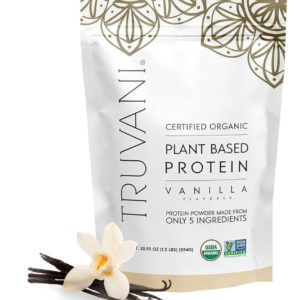

Available in 9 different flavors, Truvani Plant-Based Protein is a palate-pleasing protein powder that suits a wide range of tastes.
Key product features
Protein
20 grams
Ingredients
All-natural
Flavors
9
Subscription
Yes
What you should know
Truvani Plant Based Protein is a flavorful protein powder that uses organic pea, organic pumpkin seed, and organic chia seed protein to provide 20 grams of protein in every serving. The protein powder comes in nine different flavors, including banana cinnamon, vanilla, and chocolate peanut butter.
-
One of our product testers said it was the best plant-based protein they’ve ever had.
-
At $3 per serving, Truvani Plant Based Protein is priced about $1.00 more than the high-average market price for pea protein powders.
-
This may be a good option for people with a selective palate who need a tasty plant-based protein powder to support their protein needs.
-
Truvani Plant Based Protein has only five ingredients and is certified USDA organic and non-GMO verified.
Pros
Suitable for vegan and dairy-free diets
Good selection of flavors
Cons
Made in a facility that processes products that may contain common food allergens
Almost double the average market price
Chalky when mixed with water
How we score the best pea protein powders
Finding the right supplement that meets health goals and delivers on promised claims requires time and research. On top of that, you need to consider product safety and price.
Dedicated to helping you find the best protein powder for muscle gain, we’ve done the leg work for you. Our team tested over 100 protein powders, carefully evaluating and fact-checking each one, taking into account effectiveness, quality, safety, and price. With this thorough process, we’ve compiled a list of top recommendations, ensuring the products rank high across key areas. Learn more about our
plant-based protein powder methodology
here.
We used the following criteria to score each protein powder:
Protein source—40%
The protein source is important because it affects the product’s digestibility, nutrient profile, and environmental impact. We consider the origin of the protein to ensure it meets vegan standards and provides a high-quality, sustainable option.
Complete protein—20%
Whether the protein is complete is crucial for determining if it provides all nine essential amino acids needed for muscle repair and overall health. We consider this to ensure that the product can serve as a reliable, sole protein source without requiring additional supplementation.
Macronutrient calories per serving—15%
The balance of macronutrients per serving is important for managing energy levels, weight, and overall nutrition. We consider these calories to evaluate if the product supports specific dietary goals, such as high-protein or low-carb diets.
Our factors in this rating include:
-
Calories from protein
-
Calories from carbs
-
Calories from fats
Total protein per serving—15%
The amount of protein per serving is a key factor in determining the product’s effectiveness in meeting daily protein needs.
Our factors in this rating include:
-
20 grams of protein or less per serving
-
21 to 30 grams of protein per serving
-
Over 30 grams of protein per serving
Price per gram of protein—5%
Understanding the cost efficiency is important for those who want to manage their budget while meeting their nutritional needs. We consider the price per gram of protein to compare the value of different products.
These are the ranges we consider:
-
$0.30 to $0.50 per gram
-
$0.60 to $0.80 per gram
-
$0.90+ per gram
Sweeteners—5%
Sweeteners play a significant role in the taste, caloric content, and health impact of the product. We consider the type and amount of sweeteners used to evaluate their impact on flavor, their suitability for low-sugar diets, and any potential health implications.
Here are the common ones we evaluate:
-
Sugar
-
Dextrose
-
Honey, agave
-
Stevia
-
Maltodextrin
-
Erythritol
-
Monk fruit
-
Sucralose
-
Aspartame
-
Xylitol, acesulfame
Benefits of pea protein powder
Pea protein powder is a high-quality protein supplement made from yellow peas. (
2
) It contains all of the essential amino acids and is an excellent source of iron. (
2
)
People turn to protein powders for many reasons, from weight loss to building muscle to supporting nutrition needs. Some of the benefits of pea protein powder include:
- Supports protein intake
- Helps with muscle-building
- Preserves muscle mass
- Improves appetite control
Pea protein powders are a convenient way to add protein to your diet. You can use it to make a high-protein post-workout shake, add it to baked goods like muffins, or stir it into your morning oatmeal.
Who should use pea protein powder?
Anyone who wants or needs to add more protein to their diet can use pea protein powder. Athletes or bodybuilders who follow a vegan or vegetarian diet may find pea-based protein powders helpful in meeting their needs.
It’s also a good choice for people with a dairy allergy or sensitivity, who can’t use casein or whey protein powder.
Other pea protein powders we tried
When testing pea protein powders, we tried several popular brands before making our final choices. While some performed well, they didn’t quite meet our standards for taste, texture, or ingredient quality. Here are a few we considered but ultimately passed on:
-
Cymbiotika Plant Protein:
Despite its high-quality ingredients like spirulina, hemp, and adaptogenic mushrooms, the flavor was too earthy for some of our testers, and the texture didn’t blend as smoothly as expected. Our testers also found the deep green color unappealing for a protein powder. Additionally, at $3.66 per serving, it may be out of budget for many customers. -
1st Phorm Vegan Power Pro
:
While our testers enjoyed the iced oatmeal cookie flavor, noting it mixed well, it contains more artificial ingredients than some of the other options we tried and only 19 grams of protein per scoop. -
Gnarly Vegan Plant Protein
:
This powder boasts a strong nutrient profile, including chia and cranberry seeds, but its slightly gritty texture and mild aftertaste left some testers feeling underwhelmed. Additionally, with 16 grams of carbs and 7 grams of fat per serving, it’s not ideal for those seeking a lower calorie protein powder.
FAQs
Is it safe to drink pea protein every day?
Yes, it’s safe to drink pea protein powder every day as long as it aligns with your nutrition needs and health goals. Remember, pea protein powders are meant to supplement your diet—they’re not a replacement for whole foods. You should try to get most of your protein from whole foods and use protein powder to fill in nutrient gaps. (
3
)
Which pea protein is the best?
The best pea protein powder is the one that meets your nutrition needs, helps you achieve your goals, fits your budget, and suits your tastes and lifestyle. Pea protein powders are complete proteins, providing all the essential amino acids your body can’t make. (
2
) One of the main things to look for is that it has leucine content in it, as that is extremely beneficial for output and recovery.
Here, we’ve selected Nutricost Organic Pea Protein Isolate as the best overall, due to its high-quality formulation, third-party testing, and affordable price.
What is the difference between pea protein vs whey?
The main difference between pea protein and whey protein is the protein source. Whey protein comes from cow’s milk, while pea protein comes from yellow peas. (
3
) Pea protein is lower in methionine, making it incomplete; however combining pea protein with other plant proteins rich in methionine or as part of a higher protein diet containing variety can nullify this difference. Both can contribute amino acid building block support needed to build and maintain muscle.
Pea protein is lower in the amino acid methionine compared to whey protein. A pea protein powder that includes protein from another plant source, like brown rice, will have a better overall amino acid profile, making it just as effective as whey protein powder. (
6
)
Can you build muscle with pea protein?
You can build muscle with pea protein. However, it won’t work all by itself. To build muscle, you need to do strength-training exercises and eat a balanced diet that includes an adequate amount of carbohydrates, protein, and fat. (
6
) Pea protein powders supplement your diet, providing additional protein to support muscle-building.
How does pea protein powder compare to other protein powders?
Pea protein is a high-quality protein powder, providing all the amino acids necessary for maintaining and building muscle. Pea protein is lower in the amino acid methionine, compared to other protein sources, though it is still considered a complete protein. (
3
,
6
) Studies show that pea protein powder produces similar outcomes as other protein powders like whey protein. (
3
)
These statements have not been evaluated by the Food and Drug Administration. These products are not intended to diagnose, treat, cure, or prevent any diseases.
Our experts
Victoria Burgess, Ph.D., CSCS, CISSN
Victoria Burgess earned her Ph.D. in Health and Human Performance from Concordia University Chicago and holds her NSCA CSCS and Certified Sports Nutritionist (CISSN). She is an adjunct professor in the Human Performance and Nutrition department at Concordia University Chicago & Parker University, where she teaches undergraduate, graduate, and doctoral-level courses.
Christopher Mohr, Ph.D., RD
Dr. Chris Mohr is an internationally recognized subject matter expert and speaker and performance coach. Through his facilitation and online resources, he works closely with some of the largest corporations in the world including Deloitte, Delta Airlines, Johnson & Johnson and more to help busy executives all over the world, develop the energy to thrive personally and professionally.
Robert Wildman, Ph.D., RD, LD, CISSN, FISSN
Dr. Robert Wildman (“Dr. Rob”) is a globally renowned exercise, fitness, and nutrition expert who speaks around the world on exercise and sport nutrition, and continues to work with professional and elite athletes to achieve their highest level of performance as well as health and fitness. Rob received his Ph.D. from The Ohio State University, earned his MS from Florida State University, and earned his BS from the University of Pittsburgh. He is also a registered and licensed dietitian.
Jessica Coulon
Jessica is a contributing editor and writer for Fortune Recommends who specializes in fitness, health, nutrition, and science content. Previously, she was an editor for Popular Mechanics and Bicycling, where she covered pro cycling news, wrote how-to guides, and tested all the latest and greatest bike gear. She was also a regular shoe tester and contributor for Runner’s World. You can often find her skiing or riding her mountain bike, and racing with the F1RE female enduro team.
Lily Moe
Lily is a Brooklyn-based writer and editor with over seven years of experience in health media. As a former Fitness Coach, Lily’s editorial prowess has largely focused on fitness, nutrition, and weight management. She has also spent a fair share of time in testing labs, analyzing everything from protein powders to yoga mats. Her work has appeared in Verywell Fit, Verywell Mind, Health, and more.
Kelly Uhler
Kelly has a multifaceted background in elder care, health care, and copywriting. She has worked for organizations such as A Place For Mom and Homecare.com, which gave her the opportunity to work closely with families, providing reliable information to help them make informed decisions about their loved one’s health, safety, and quality of life.

Jill Corleone, RD
Fortune Recommends Nutrition Writer
About Author
Jill’s life has centered around nutrition and fitness for more than two decades. After earning her bachelor of science in nutrition at New York University in Manhattan, Jill went on to complete her internship at the University of Medicine and Dentistry of New Jersey in Newark.
She spent the early part of her career working as a clinical dietitian with a focus on pediatric nutrition. She then transitioned into management. Jill began her career as a freelance writer in 2007 while working as a clinical nutrition manager in Florida. She became a full-time writer in 2010 after the birth of her first child.
Jill has written for numerous publications, including Verywellfit, Diabetes Self-Management, Huffington Post, Livestrong.com, and SFGate.
References
-
-
Alcorta, A., Porta, A., Tárrega, A., Alvarez, M. D., & Vaquero, M. P. (2021). Foods for Plant-Based Diets: Challenges and Innovations. Foods (Basel, Switzerland), 10(2), 293.
https://doi.org/10.3390/foods10020293
-
Shanthakumar, P., Klepacka, J., Bains, A., Chawla, P., Dhull, S. B., & Najda, A. (2022). The Current Situation of Pea Protein and Its Application in the Food Industry. Molecules (Basel, Switzerland), 27(16), 5354.
https://doi.org/10.3390/molecules27165354
-
Office of Dietary Supplements. Dietary supplements: What you need to know. Accessed June 9, 2024.
https://ods.od.nih.gov/factsheets/WYNTK-Consumer/
-
Gundala, R. R., & Singh, A. (2021). What motivates consumers to buy organic foods? Results of an empirical study in the United States. PloS one, 16(9), e0257288.
https://doi.org/10.1371/journal.pone.0257288
-
Pawlak, R., Berger, J., & Hines, I. (2016). Iron Status of Vegetarian Adults: A Review of Literature. American journal of lifestyle medicine, 12(6), 486–498.
https://doi.org/10.1177/1559827616682933
-
Kerksick, C. M., Wilborn, C. D., Roberts, M. D., Smith-Ryan, A., Kleiner, S. M., Jäger, R., Collins, R., Cooke, M., Davis, J. N., Galvan, E., Greenwood, M., Lowery, L. M., Wildman, R., Antonio, J., & Kreider, R. B. (2018). ISSN exercise & sports nutrition review update: research & recommendations. Journal of the International Society of Sports Nutrition, 15(1), 38.
https://doi.org/10.1186/s12970-018-0242-y
-
Babault, N., Païzis, C., Deley, G., Guérin-Deremaux, L., Saniez, M. H., Lefranc-Millot, C., & Allaert, F. A. (2015). Pea proteins oral supplementation promotes muscle thickness gains during resistance training: a double-blind, randomized, Placebo-controlled clinical trial vs. Whey protein. Journal of the International Society of Sports Nutrition, 12(1), 3.
https://doi.org/10.1186/s12970-014-0064-5
-
Hertzler, S. R., Lieblein-Boff, J. C., Weiler, M., & Allgeier, C. (2020). Plant Proteins: Assessing Their Nutritional Quality and Effects on Health and Physical Function. Nutrients, 12(12), 3704.
https://doi.org/10.3390/nu12123704
-
Amatori, S., Callarelli, C., Gobbi, E., Bertuccioli, A., Donati Zeppa, S., Sisti, D., Rocchi, M. B. L., & Perroni, F. (2023). Going Vegan for the Gain: A Cross-Sectional Study of Vegan Diets in Bodybuilders during Different Preparation Phases. International journal of environmental research and public health, 20(6), 5187.
https://doi.org/10.3390/ijerph20065187
-
Chapman-Lopez, T. J., & Koh, Y. (2022). The Effects of Medium-Chain Triglyceride Oil Supplementation on Endurance Performance and Substrate Utilization in Healthy Populations: A Systematic Review. Journal of obesity & metabolic syndrome, 31(3), 217–229.
https://doi.org/10.7570/jomes22028
-
Office of Dietary Supplements. Dietary supplements for weight loss. Accessed June 9, 2024.
https://ods.od.nih.gov/factsheets/WeightLoss-HealthProfessional/
-
Moon, J., & Koh, G. (2020). Clinical Evidence and Mechanisms of High-Protein Diet-Induced Weight Loss. Journal of obesity & metabolic syndrome, 29(3), 166–173.
https://doi.org/10.7570/jomes20028
-
National Library of Medicine. Saturated fat. Accessed June 9, 2024.
https://medlineplus.gov/ency/patientinstructions/000838.htm
-




